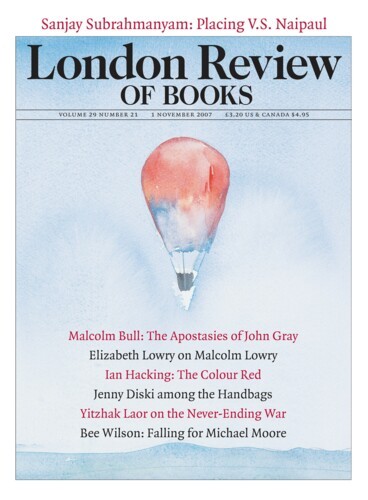The ‘white tree’ in Jena, Louisiana was cut down this summer. In September 2006 a black pupil asked the white principal of Jena High School if black students could sit under this tree, where only white students ever sat. He answered: ‘You can sit anywhere you want.’ Three nooses then appeared in the tree, fights began, and six black teenagers were charged with the attempted murder of one white boy, who was well enough to go out on the evening of the day he was attacked. The white boys who hung the nooses were suspended from school for three days. An all-white jury convicted Mychal Bell, one of the black students, on a reduced charge of aggravated second-degree battery, which could have brought a 15-year sentence. The saga of the Jena Six began, a story of unequal punishment before the law that is all too familiar. Bell’s conviction has now been overthrown and he has been released on bail after ten months in jail, although he still faces trial as a juvenile, and charges against the other five have been scaled back.
An American story? Well, not entirely. The tree’s destruction takes us back to old English law; it is a ritual of expiation. In medieval jurisprudence, inanimate objects could have intent, homicidal taint and malicious influence. If a thing caused death, it was declared deodand, ‘a thing given to God’. If a man tripped over his dog and died, the dog would be judged legally as ‘moving to the death’ of his master. If a person possessed of reason was thrown off his horse or fell off his boat when drunk, vengeance was taken on the horse or the boat. In The History of English Law (1895), Frederic Maitland and Frederick Pollock observed that ‘many horses and boats bore the guilt which should have been ascribed to beer.’ The ritual survived in England until 1846, when the public balked at its application to railway engines.
In The Common Law (1881), Oliver Wendell Holmes wrote that ‘the customs, beliefs or needs of a primitive time establish a rule or a formula. In the course of centuries the custom, belief or necessity disappears, but the rule remains.’ In the Deep South, slaves had the legal status of a dog, a horse, or any other object of value. And it was as his possession that the master would deliver a slave up to justice. Often he would receive compensation from the state for his loss. The legal terror that was so much a part of slavery depended on maintaining this fitful valuation of persons as things.
The law of the deodand redeemed deaths by misadventure, and the cutting down of the tree is intended to redeem what went on in Jena. One member of the LaSalle Parish School Board, Billy Fowler, explained that ‘there’s nothing positive about that old tree. It’s all negative. And I’m serving on the new school board, and we’re wanting to start fresh on some things.’ Starting fresh is part of the American dream. Perhaps that’s why the realities of lynching – ‘Black bodies swinging in the southern breeze,/Strange fruit hanging from the poplar trees,’ as Billie Holiday sang – are part of a history that is erased with every new administration, with every Martin Luther King Day. But the return to chain gangs in the summer of 1995, the hitching of prisoners to posts in Alabama, the purging of books, both legal and religious, from prison libraries throughout the US right now, remind us that though the tree in Jena has been surrendered to the myth of a new beginning, the past lives on.
The tree did not offend. The officials who cut it down sought to cleanse the place of hate, while absolving the students who tied the nooses. Does that forfeit remove the taint of prejudice and discrimination? Does it cancel the debt owed the stigmatised? Two hangman’s nooses were found at the US Coast Guard Academy in the summer, the first in the bag of a black cadet and the second in the office of a woman who gave race relations training. And a noose was discovered last month on the office door of a black professor at Columbia University Teachers College. Intolerance and humiliation coalesce in these new rituals. The irrational continues to haunt the civilising claims of the reasonable.
Send Letters To:
The Editor
London Review of Books,
28 Little Russell Street
London, WC1A 2HN
letters@lrb.co.uk
Please include name, address, and a telephone number.

